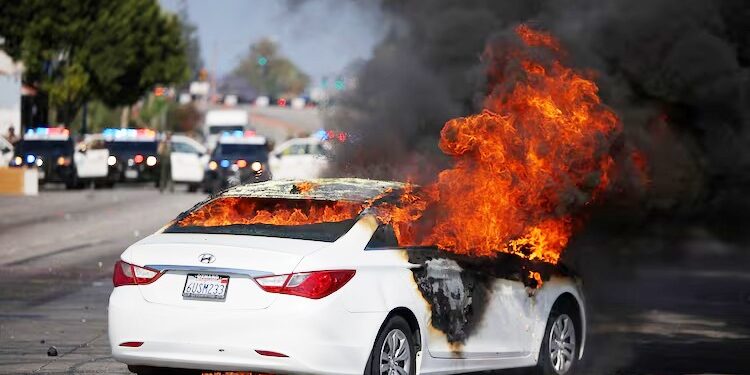Donald Trump has ordered the deployment of the National Guard to Los Angeles following a weekend of escalating violence and civil unrest, marking the most forceful federal intervention in a US city since his return to presidential campaigning intensified earlier this year. The former president, who is seeking a second non-consecutive term in office, blamed the city’s Democratic leadership for what he called “total breakdown and disgraceful lawlessness.”
The deployment was authorised after a series of large-scale protests against police brutality turned violent in downtown Los Angeles and surrounding neighbourhoods. Businesses were looted, public transport was disrupted, and over 200 people were arrested by local authorities. Two police officers were injured and dozens of vehicles set ablaze in what city officials described as an “organised escalation” by extremist elements.
Trump, speaking at a rally in Phoenix, used the unrest to launch a broadside against Los Angeles Mayor Karen Bass and California Governor Gavin Newsom. “Mayor Bass has completely lost control of her city, and Newsom is too busy trying to look good on TV to do his job,” Trump declared to loud applause. “If they won’t act to protect Americans, I will.”
The National Guard troops—initially 800 personnel—have been instructed to assist with securing government buildings, maintaining curfews, and guarding key transit infrastructure. Although the White House stressed the deployment was temporary and at the request of “concerned local officials,” both Bass and Newsom denied formally requesting federal intervention. “This is not martial law, and we do not welcome political stunts,” the mayor said in a televised press briefing.
The move has stirred fierce debate. Supporters argue that federal help was overdue in addressing chronic lawlessness and a perceived spike in urban violence. Critics see it as a dramatic overreach by a presidential candidate exploiting civil unrest for electoral gain. Civil liberties groups, including the ACLU, warned that federal troops on city streets risk inflaming tensions and violating constitutional rights.
The timing is significant. With the 2024 election cycle well underway, Trump’s law-and-order message is returning to the forefront of his platform, echoing themes from his 2020 campaign. Strategists on both sides note that Trump’s sharp attacks on blue-state leaders are designed to galvanise suburban voters concerned about security and governance, particularly in states like Arizona, Georgia, and Pennsylvania.
Governor Newsom responded sharply, calling Trump “a failed former president who never understood California and never will.” He insisted that California would not be “bullied into chaos by those who thrive on division.”
As Guard units began patrolling Los Angeles streets Sunday night, residents voiced mixed reactions. Some welcomed the presence as a necessary step toward restoring order; others viewed it as a chilling symbol of polarised American politics. With tensions still high, questions linger about whether federal muscle will bring calm—or ignite further turmoil.
newshub finance



Recent Comments